Our Stories 2019
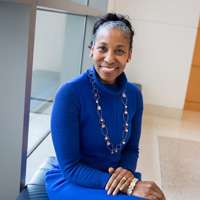
Know your family history - Angela Deaver Campbell
“I'm the poster child for why you get your colon cancer screening,” says Angela Deaver Campbell who was 50 years, 3-months-old when she got a colonoscopy. “They discovered a polyp that looked suspicious. It was cancer. I had surgery, which ended up being a colon resection because they found the polyp had gone awry where the large intestine meets the small intestine. I think they took out one foot of my colon. Colon cancer is very slow growing, and my doctor told me that polyp had been growing anywhere from eight to 12 years. I didn’t realize that colon cancer ran in my family. My aunt said she had been getting screened since she was 35-years-old. So you have to do your family history. If you really want to take care of your health, knowledge is power.”
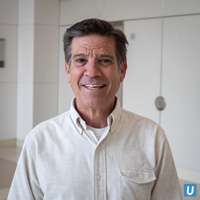
UCLA helped me get cancer free - Kevin Brophy
“If I had come in six months later there was nothing they could have done,” says Kevin Brophy, who came into Ronald Reagan UCLA Medical Center for a colonoscopy and discovered he had stage four colorectal cancer. “I had a seven centimeter tumor in my rectum. There are seven signs of cancer, and I basically had all of them. I blew off the signs because I didn’t like doctors. I went from being someone who had never been to the doctors to feeling like I now know every doctor at UCLA Health. They all say, ‘we’re here to help you, Kevin.’ I did radiation for six weeks, chemotherapy for six weeks and had surgery in December of 2013. The cancer popped up again in 2017 and I did 11 chemotherapy infusions. My scan in July of last year was really clean. It was cancer-free. I made it through the five-year battle and am on the other side. Everyone has been there to help me get healthy."
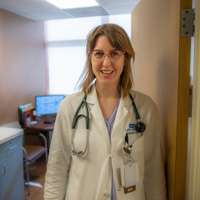
Not just a man's disease - Laura McEnerney, MD
“A lot of women think colon cancer is a man’s disease, but it’s the third leading cause of cancer death in women,” says Dr. Laura McEnerney, gastroenterology physician at the UCLA Health specialty care clinic in Santa Clarita. “It’s important for women, as well as men, to do their colonoscopy screening when they are 50 years old, for the average-risk patient, so that we can remove any polyps before they develop into cancer. It’s a routine screening, and a small thing to take out polyps, but it makes a real difference and can save patients from dealing with much greater consequences many years down the road. My recommendation is that all men and women should be screened for this disease.”
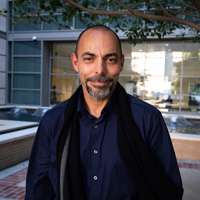
Normalizing after cancer - Cesar Perez
“If my doctor had done a physical examination in 2016, instead of assuming I had hemorrhoids, my colon cancer would have been found sooner,” says 52-year-old Cesar Perez, who came to Ronald Reagan UCLA Medical Center for a second opinion on treatment and surgery in November of 2017. “The tumor was a big size for its location, and my understanding is there are very few surgeons who can do what Dr. Kevork Kazanjian did, so I’m very fortunate. Before my first surgery, I went through radiation and chemotherapy. After surgery, I received eight more sessions of chemo. In December of 2018, I had an ileostomy reversal, which means I can have a normal life again. Now I’m in recovery and waiting for my digestive system to normalize. The care and service here at UCLA Health is amazing.”
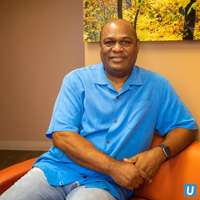
It wasn't so bad - Edmund Lee
“To be honest, I was very nervous and concerned about the colonoscopy, but I knew I needed to have it done,” says 65-year-old Edmund ‘Corkey’ Lee, a patient at the UCLA Health primary care clinic in Santa Clarita. “It ended up being not bad at all and I was worried for nothing. The hardest part was drinking the juice beforehand, which cleans everything out of your system. I woke up to a fresh day with everything clean inside. At my age, you need to get a colonoscopy. My doctor was great. He explained everything to me and was so calm and matter-of-fact. I recommend everyone who needs to get a colonoscopy should do it because it’s not that bad.“
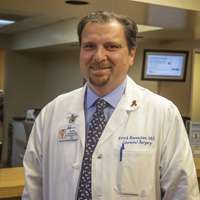
Clearing up misconceptions - Kevork Kazanjian, MD
“I think one of the common misconceptions is that if you don’t have any family history of colon or rectal cancer then you aren’t going to get it,” says Dr. Kevork Kazanjian, chief of colorectal surgery at UCLA Health. “In fact, the vast majority of patients who are diagnosed with colon or rectal cancer have no family history whatsoever. Another misconception is that when patients have symptoms like bleeding, pain or changes in their bathroom habits they assume it must be hemorrhoids. It’s important that if something doesn’t seem right, patients have the area examined, even patients in their 20s or 30s. Our primary clinic is in Westwood at Ronald Reagan UCLA Medical Center, but we also have an outreach clinic in Santa Clarita to offer patients access close to home.”
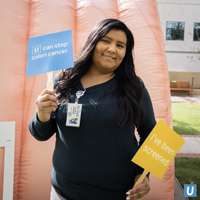
Colon cancer advocate for the Hispanic community - Christiana Camacho, RN
"My mother was diagnosed with colon cancer when she was 48 and passed away at 49 years old," says Christiana Camacho, a nurse at Ronald Reagan UCLA Medical Center and advocate for colon cancer screenings. "I had my first colonoscopy done about eight months ago, and I will get one every five years as part of my screening because it was in my family. My mom and a lot of old school Hispanic families ignore their own health. I know that colon cancer is preventable, and if my mom had early detection maybe she'd be here today. I do everything I can to spread the awareness.”
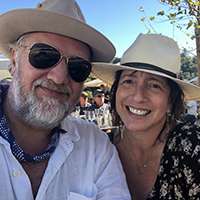
Colon cancer cured thanks to routine screening - Kells Jesse
Kells Jesse, a production designer who lives in Venice, says that in recent years, he and his wife, Sylvia Castillo-Jesse, have made major lifestyle changes to prioritize their health. They optimized their nutrition and now eat a mostly vegan, plant-based diet; they incorporated more exercise into their routines; and last spring, they scheduled their routine colon cancer screening tests.
While Jesse had his first screening right at 50, the doctor who removed some precancerous growths called polyps, told him to return for a follow-up test in three years. Unfortunately, life got in the way, and he waited an extra two years. “I work a lot and lead a busy life,” he says, “so I always had an excuse to put it off.” In April, he finally got a referral from his primary care physician at the Bob Hope Health Center to see Dr. Mary Farid in Santa Monica. At his appointment in June, they discussed his overdue colonoscopy and some other GI issues, and then scheduled the procedure. When Dr. Farid performed the colonoscopy in September, she saw a suspicious-looking lesion that she couldn’t easily remove. “I wasn’t 100% certain it was cancer,” she says. “But we definitely needed to rule it out.” She removed a small tissue sample to biopsy, which pathology later confirmed was adenocarcinoma. Jesse was shocked by his diagnosis. “When I heard the word ‘cancer,’ I couldn’t grasp it,” he says. His wife jumped into action, and worked with Dr. Farid to schedule a CT scan to make sure the cancer had not spread. Dr. Farid also referred Jesse to a surgeon who could remove the lesion. Continue Kells' story
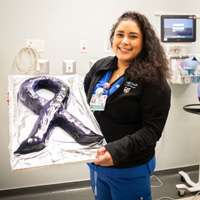
Baking for awareness - Marissa Chavez
“I love to bake, and the blue ribbon helps raise awareness,” says Marissa Chavez, a gastroenterology technician at Ronald Reagan UCLA Medical Center. “March is colon cancer awareness month. Two years ago I wanted to make a cake, so I made it in the form of colon, with intestines that had polyps. It’s become a tradition now that I make that cake, and throughout the year I bring in cupcakes or cakes with the blue ribbon. My mom got colon cancer when I was 13, and when I started working in the medical field I realized what gastroenterology was and wanted to get into it. This Thanksgiving will be her 24th year cancer-free, and baking is my way of spreading the word.”
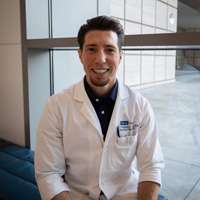
One question - Daniel Croymans, MD, MBA, MS
“It's just one question: ‘Have you had your colon cancer screening?’” says Dr. Daniel Croymans, a primary care physician at Ronald Reagan UCLA Medical Center. “March is colon cancer awareness month and the purpose of this is to increase awareness both for the general public as well as in the healthcare system. You don’t have to have an MD to have a conversation about colon cancer screenings. I believe our front desk staff, our clinic managers and our teams can work together to bring up the conversation about colon cancer screenings. If a patient comes in who is 50 or older, ask them if they’ve had a colon cancer screening done, or check the electronic medical record to see if the records are accurate. Whether it’s also a phone call from staff or a patient portal message, it’s still important for physicians to have this brief conversation and let patients know that if colon cancer is caught at stage one it’s 90 percent curative.”
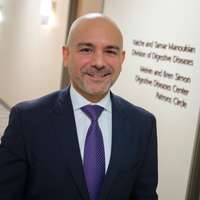
Do you want to be healthy? - Eric Esrailian, MD, MPH
“Do you want to be healthy? Not just now, but in 10, 20 or 30 years from now?” asks Dr. Eric Esrailian, chief of the Vatche and Tamar Manoukian Division of Digestive Disease and director of the Melvin and Bren Simon Digestive Disease Center at UCLA. “If the answer is yes to that question, it doesn’t make sense not to utilize all the knowledge and technology we have available to us. If a patient meets the criteria, they should be getting screened for colon cancer. This is one of the only screening tests that can actually be preventative. In Los Angeles, we don’t feel like there should be any excuse for someone not to get screened. We want to eliminate any barriers and give patients as many options as possible. There is more than one way to get screened; a colonoscopy or stool testing. If a patient has concerns we want to address those and help alleviate any fears. We want to increase screening rates in our community so that we give patients the best possible care and the care that they deserve.”
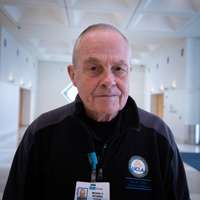
Coming to UCLA is like coming home - Michael Richards
“Little did I know that there was kind of a time bomb within me,” says Michael P. Richards, a patient liaison volunteer at Ronald Reagan UCLA Medical Center who checked into the emergency room after having trouble walking. “I was diagnosed with stage three colorectal cancer in March of 2014. I’m so prejudiced because of this hospital and my career here as UCLA faculty administration, but it was my UCLA family that got me through this period. Even though chemotherapy was not something fun, I always felt like coming to UCLA was like coming home. I owe everything to my doctors and UCLA. Now, when I’m volunteering, and someone comes in for the same thing I went through, I understand their journey and can say, ‘I’m well, due to this hospital. You will be too.’”
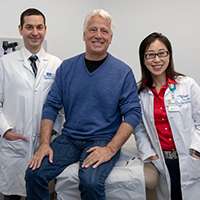
From a stage III colon cancer diagnosis to a cure, in a year - Jim Frost
Jim Frost, 57, is an avid hiker, who spends hours each week on local trails. He is also a real estate broker and appraiser; a husband and dog owner; and a cancer survivor, who was diagnosed with Stage III colorectal cancer last year after a routine screening.
Before he was diagnosed with colon cancer, Frost went in for a primary care appointment last February with Dr. Philip Cohen at the UCLA Health Encino office. During this checkup, Dr. Cohen noted that Frost was long overdue for his colon cancer screening, which he should have had at 50. Because Frost was also experiencing some abdominal pain, Dr. Cohen referred him to see Encino-based gastroenterologist Dr. Ara Kardashian, to discuss both his symptoms and that screening. About two weeks later, Dr. Kardashian met with Frost, who says he put off his colon cancer screening because he didn’t like the idea of the colonoscopy prep and was nervous about the procedure itself. But his worries turned out to be unfounded. “The prep wasn’t fun, but not being able to eat the day before the procedure was much worse,” says Frost, noting that he was starving. The procedure, on the other hand, was fine. “You don’t feel anything because they put you under anesthesia,” he says. Frost did, however, wake up from anesthesia to some unsettling news. During the colonoscopy, Dr. Kardashian found a mass that he thought looked malignant. “When Dr. Kardashian came in to talk to me and said that he had found cancer, it’s like the floor fell out from under me,” says Frost. “I was just in shock.” Continue Jim's story
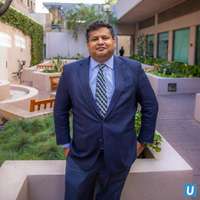
What screening option is best for you? - V. Raman Muthusamy, MD, MAS
"The month of March is devoted to trying to raise awareness about colorectal cancer,” says Dr. V. Raman Muthusamy, medical director of endoscopy for UCLA Health. “Colorectal cancer is the second leading cause of cancer-related deaths in this country. We have made some inroads over the past two decades but, unfortunately, a sizeable percentage of the population is still not getting screened. We probably screen in the 60% range of eligible patients, which means nearly four in ten patients are not getting screened. There are a variety of tests, so if a patient is hesitant to do a colonoscopy, there are less invasive screening tests that can be used. Patients should talk to their doctor about what option is best for them and get screened.”
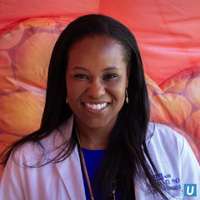
Colonoscopy and the veteran population - Folasade P. May, MD, PhD, MPhil
“One of the things we’ve noticed among veterans is that they have a higher rate of colon polyps,” says Dr. Fola May, director of quality improvement for gastroenterology at UCLA Health. Dr. May was raising awareness at UCLA Medical Center, Santa Monica for National Colorectal Cancer Awareness Month in March. “When we do colonoscopy screenings, we’re more likely to find a polyp in a veteran than a non-veteran. We think that might have to do with lifestyle and risk factors. Veterans are pretty good at following their provider recommendations, so they’re more likely to come and get their screening test for any type of preventative service. The screening rate in the VA is about 82%, which is much better than the national rate of about 65%. Everyone should get screened. For patients who aren’t interested in a colonoscopy, we also offer less invasive screenings tests.”
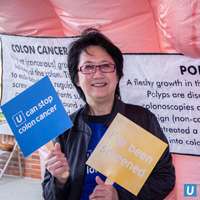
Don't ignore bleeding - Anaice Chang, RN
“If you have any bleeding, don’t ignore it,” cautions Anaice Chang, a procedure nurse in the gastroenterology lab at UCLA Medical Center, Santa Monica. “You have to let your doctor know. It can be a hemorrhoid, but don’t ignore it. I always encourage people over 50, even my family and friends, to have their colonoscopy screening. It doesn’t happen all the time, not every day, but in a lot of patients the doctor will find a polyp while doing the colonoscopy.”
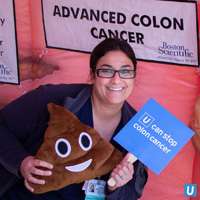
Colon cancer often has no symptoms - Jessica Sparks, RN
“One of the misconceptions, I think, is that if you don’t have symptoms, you don’t have cancer,” says Jessica Sparks, a registered nurse at UCLA Medical Center, Santa Monica who stopped by the inflatable colon for Colon Cancer Awareness Month. “You can still have cancer, even if you don’t have symptoms. We need to make sure that everyone knows to get your screenings when your doctor recommends and to always do your follow up if you find anything odd in your screening. Your primary physician will be able to instruct you on when to start, whether you know your family history or not. If you have colon cancer, you want to catch it early.”
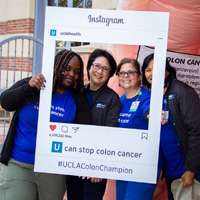
High-risk patient should not postpone colon cancer screening - Nancy Hart, RN
“If you have a colon cancer history in the family, we suggest you do your colonoscopy at any time, rather than waiting,” says Nancy Hart, far right, a procedure nurse in the gastroenterology lab at UCLA Medical Center, Santa Monica. She encourages high-risk patients not to wait until the recommended 50-years-old mark for a colon cancer screening. Nancy, along with other GI lab nurses, came out to support National Colorectal Cancer Awareness Month. “During a colonoscopy the endoscopist examines a patient’s entire colon, looking for any polyps, abnormalities, bleeding or changes in the lining of the colon. It’s important that the patient prepares for this procedure by doing a liquid diet and colon prep the day before, so they have an optimal exam. It’s very important to get your colonoscopy for colon cancer prevention.”